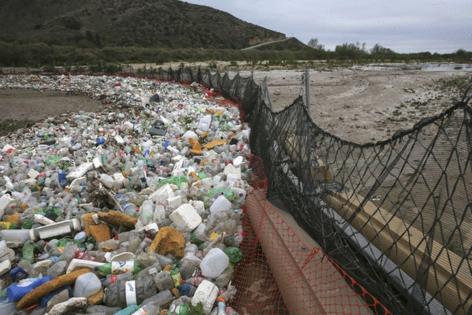EPA commits to '100% cleanup' of chronically polluted Tijuana River in memo of understanding with Mexico
Published in Science & Technology News
Environmental Protection Agency Administrator Lee Zeldin committed the Trump administration to “a permanent, 100% solution to the decades-old Tijuana River sewage crisis” in a new agreement signed with Mexico on Thursday.
“I smelled for myself that foul smell that so many residents of Southern California have been complaining about for so long,” Zeldin said, adding that President Trump was highly motivated after hearing from Navy Seals who must train in the polluted waters of the Pacific Ocean where the Tijuana River meets the sea.
“Today, what we are demonstrating is that, yes, it can be done,” said Mexico Secretary of Environment and Natural Resources Alicia Bárcena, preparing to sign the memorandum of understanding, or MOU.
Pollution in the 120-mile long river has been so egregious that recent studies have shown that even the air above the river or the spray where it reaches the surf is dangerous.
The Tijuana River begins in Baja California, Mexico, and discharges into the ocean at Imperial Beach. The pollution consists of sewage, including drugs and pharmaceuticals that people ingest, plus industrial discharges.
According to the agreement, Mexico will shake loose $93 million in money it previously committed, known as “Minute 238 funds.” Deadlines for several long-discussed improvements will also come sooner — some this year — it says. One example is the 10-million gallons per day of treated effluent that currently flows into the Tijuana River from the Arturo Herrera and La Morita wastewater treatment plants and will now go to a site upstream of the Rodriguez Dam, southeast of Tijuana.
Zeldin said technical experts, leadership and U.S. staffers identified these as high priorities. The MOU also commits the two countries to taking into account Tijuana’s growing population, to make sure that infrastructure improvements are not outstripped by changes on the ground.
“This is a massive step forward for the Tijuana River,” said Tom Kiernan, president and chief executive of the environmental group American Rivers. It has listed the river as the second most endangered in the U.S.
Kristan Culbert, associate director of California river conservation at American Rivers, said she hoped the MOU negotiated by this administration “will be the catalyst for a major turnaround for this river. The people and wildlife that depend on it deserve clean water and healthy ecosystems.”
San Diego County Supervisor Paloma Aguirre was more cautious. She said the agreement does not necessarily address the range of dangerous chemicals the river is carrying. As it flows to the U.S. side, it may have gone through a sewage treatment plant, but that may only remove bacterial contaminants, not industrial pollutants.
“Unless this pollution is eliminated at the source, our community will continue to suffer,” the supervisor, who is also the former mayor of Imperial Beach, said. Her concerns are backed up by recent research.
Yet Aguirre also expressed optimism. “Today’s agreement is a sign that our voices have been heard. I hope to see real progress in the next few months, and not the next few years.”
Zeldin stressed cooperation with his counterpart, Bárcena. When asked about leverage that will assure changes are made, Zeldin cited money that could be withheld by the U.S.
He emphasized it’s the first agreement between the two governments under this administration. “We’re very proud of that,” he said.
_____
©2025 Los Angeles Times. Visit at latimes.com. Distributed by Tribune Content Agency, LLC.







Comments